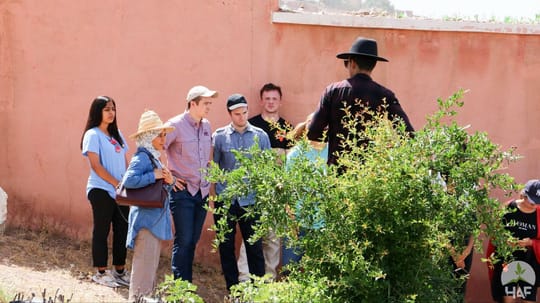Experiential Learning - A Hands-on Approach to Sustainable Development

As a university student entering my junior year, I have acquired a vast array of information on participatory development practices from experienced professors and well-respected texts. Global development studies, my major of choice, has allowed me the freedom to explore interdisciplinary topics ranging from economics to politics, all in an effort to widen my analytical landscape. So often in academia, however, even with the vast area of disciplines to explore, we subject our learning to the confinement of a classroom. While truly remarkable and innovative thoughts and discoveries can emerge from the classroom, the application of these discoveries in real world situations is an extremely beneficial method of learning for both students and development organizations.
The term “hands-on learning” or “experiential learning” has all too often been reserved for scientific disciplines such as medicine, engineering, or design. Experiential learning refers to an approach of instruction that immerses the student in the subject matter using real-world tools and experiences to foster more holistic understandings. Experiential learning opportunities may take many different forms and span a range of disciplines including but not limited to community service, study abroad, research projects, internships, and more. Implementing experiential learning techniques and providing students with opportunities and funding for travel leads to greater application of acquired knowledge and the development of employable technical skills.
Liberal arts studies, especially those that involve global populations, are essential areas for field research. In educating the next generation of policymakers, social advocates, and civil servants, and more, it is important to instill principles of sustainable development that encourage innovative problem solving. Additionally, experiential learning supports all types of learners, whether audio, visual, or kinesthetic, because it engages learners as “whole persons” with emotions, values, and thought-processes that guide analysis. Specifically in the field of global development, experiential learning allows students to gain knowledge through authentic situations and discussions with affected peoples.
Experiential learning also utilizes multi-actor collaboration to demonstrate the process of consensus building. When students have the opportunity to collaborate with localities and organizations to produce community driven solutions, they are better equipped to engage in joint initiatives in sustainable development fields.
Organizations that engage students and community members in experiential learning can also have their work and ideologies reflected back at them through the lens of the learners. By analyzing what the students are observing in the field, they have a better understanding of what practices, ideologies, and methods to alter. Additionally, as the field of global development is one necessary for multilateral partnership, students are able to learn collaborative practices for best outcomes.
My own personal experience interning for the High Atlas Foundation (HAF) located in Marrakech, Morocco has supplemented my learning at the University of Virginia, giving me an inside look into the administrative routine tasks of an NGO while also providing me with unique opportunities to participate in field visits, observing the work of HAF in its partnering communities. HAF has coordinated programs with educational institutions both in Morocco and abroad to enhance learning and awareness of development issues.
While interning for HAF in Morocco, I have seen many of the concepts I have studied at university in practice. Theories surrounding participatory development, capacity building, and policy have taken new meanings when their application is demonstrated in-person and with topic synthesis. I have gained experience with grant and article writing that will facilitate my learning back at university. By visiting rural communities in the High Atlas Mountains, I observed the irrigation systems and earthquake recovery practices put in place by HAF as well as the community response to the implemented technologies. Observing the work of argan oil and rug cooperatives has given me an example of an efficient and profitable participatory development method in action.
By expanding outside of the classroom and even beyond national borders, I have been exposed to the policies, laws, priorities, and traditions of another country. In addition to me benefiting from interning at HAF, HAF gained a better understanding of how their methods are interpreted. If HAF is able to be self-critical and flexible enough to change or discard methods, that is advantageous for beneficiaries.
Educational institutions and international organizations should place a greater emphasis on engaging students in experiential learning approaches for the benefit of the students, organization, and beneficiaries. These approaches may take many forms, but should encourage students to think critically with real-world examples and through dialogue across differing groups. Bringing students to the field continues the action of learning where the classroom falls short, and prepares them to be active and engaged members of their communities.
Fionette King is a student at the University of Virginia and an intern at the High Atlas Foundation in Morocco.